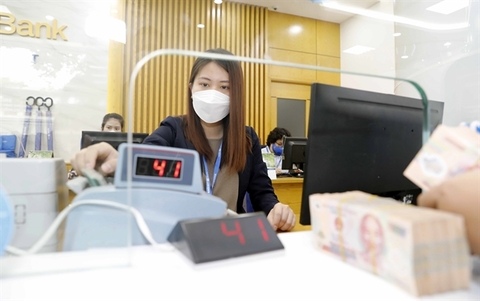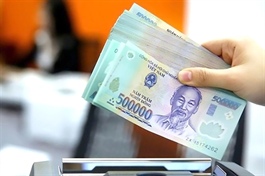Corporate bond market to get back on track
Corporate bond market to get back on track
After stagnating for half a year, the corporate bond market has shown signs of recovery following the implementation of Decree No 8, as the value and volume of issued bonds surged in March, said insiders.

|
While the first two months of the year reported two successful bond issuances, one each month, 12 batches of corporate bonds from 11 companies were released in March, worth nearly VND25 trillion (US$1.1 billion), according to a calculation based on data published by the Ha Noi Stock Exchange (HNX).
Specifically, the real estate industry which accounted for approximately 96 per cent of the entire value of issuance in March with VND23.78 trillion, was the dominant group. Real estate bonds have an average interest rate of 10.6 per cent a year and an average term of 2.43 years.
The largest batch of bonds was issued by Hung Yen Urban Development and Investment Company, with two lots of zero-coupon bonds of VND4.5 trillion and VND2.75 trillion.
Meanwhile, Dream City Villas Real Estate Trading Co Ltd released a batch of bonds with an interest rate of only 6 per cent a year, much lower than the common ground.
Other real estate businesses that successfully issued bonds in March were Nam An Investment and International Trading Company, Thu Do Investment And Import Export Trading Co Ltd, Luxury Living Furniture Trading Co Ltd, and Southern Star Urban Development and Trading Investment JSC.
The total of bonds issued in the first quarter was nearly VND25.5 trillion.
Analysts said that the real estate bond market is rebounding thanks to Decree No 8/2023/ND-CP dated March 5 to amend, supplement, and suspend the effect of some articles in decrees stipulating the private offering and trading of corporate bonds in the domestic market and the offering of corporate bonds to the international market.
The decree helps stabilise the bond market as well as the financial market in the short term, thereby luring capital flows back to the real estate market.
It also creates a legal corridor for negotiating with bondholders to pay debts using alternative assets and extend maturities.
"Issuing organisations have more time to restructure their finances if they successfully negotiate a deal with bondholders to extend debts and have additional options to repay lawful bondholders," said Do Bao Ngoc, Deputy General Director of Viet Nam Construction Securities JSC.
"Bondholders have a better chance of getting paid the principal and interest with other assets of commensurate value. The interests of bondholders are still given prominence in Decree No 8."
Statistics from the Viet Nam Bond Market Association (VBMA) showed that the total value of bonds bought back before maturity last month was nearly VND14.3 trillion, an increase of 137 per cent on-month and 64 per cent on-year.
Of which, construction and consumer goods are the two groups with the largest repurchase value, reaching VND5 trillion and VND3.4 trillion, respectively.
In the first three months of the year, the amount of bonds repurchased by enterprises totalled VND29.86 trillion, a 63 per cent increase over the same period last year.
Viet Dragon Securities Company (VDSC) said that recent policies, including Decree No 8, have not only improved the market sentiment, but also been positive catalysts for industries with large market capitalisation such as real estate.
Businesses will find it easier to access capital from credit institutions after mobilising working capital.
Moreover, the pressure of paying principal and interest of due bonds is eased thanks to the higher possibility of extending maturities of bonds after credit institutions repurchase bonds from investors.
Thereby, the draught amendment to Circular No 16 on regulations on credit institutions and foreign bank branches buying and selling corporate bonds to remove the bottlenecks of the corporate bond market will support the liquidity of the bond market, including real estate bonds, according to VBMA.
VBMA also believes that the amendment to Circular No 16 will introduce stricter regulations, such as controlling the purpose of bond issuance money and debt-to-equity ratio, to enhance safety in corporate bond purchase and sale activities.




















